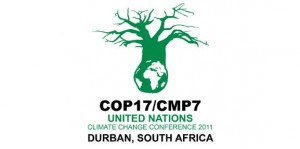Dickinson to Durban » Entries tagged with "Developing Countries"
Durban’s Challenge

By Timothy Damon ’12 With a population of more than 3.5 million people and an area of more than 2,300 km2, Durban is one of the most significant urban and economic centers in South Africa. A port city, it is on the front lines of climate change – at risk from storm surge and sea-level rise in addition to heat waves and air pollution. The local government has initiated some steps to address these hazards, but … Read entire article »
Filed under: Climate Change, Environmental Politics
Legally Binding Agreement at COP17?

(If you’re new to this blog or the discussion on legally binding agreements at international climate negotiations, please see this blog in order to gain some background knowledge). After the two most recent UNFCCC Conferences of the Parties, COP 15 and COP16, some least-developed countries are still holding out for a legally binding commitment at COP17. However, due to political concerns, the concept of a legally bound commitment is viewed differently by each country involved in … Read entire article »
Filed under: Climate Change, Environmental Politics, Key COP17 Issues
Cramped and Crowded
My favorite yoga teacher always jokes that the only way to get world leaders to agree on anything is to force them into doing hot yoga together. With yoga mats arranged only inches apart in a small studio heated to 98 degrees Fahrenheit, each state head would have to peacefully “negotiate” their space, attempting to stay fully conscious of their breathing and the future of the world as each sweats on the other. I could not help by remember this joke during our class simulation of the United Nations Framework Convention on Climate Change last week. Each group comprised of ten or so countries divided into negotiating blocs denoted by their economic status: “developed,” “developing,” and “other developing” (i.e. “least developed”). We represented a specific state, simultaneously functioning under a … Read entire article »
Filed under: Climate Change, Key COP17 Issues, Mosaic Action, Summer Reading Responses

Recent Comments